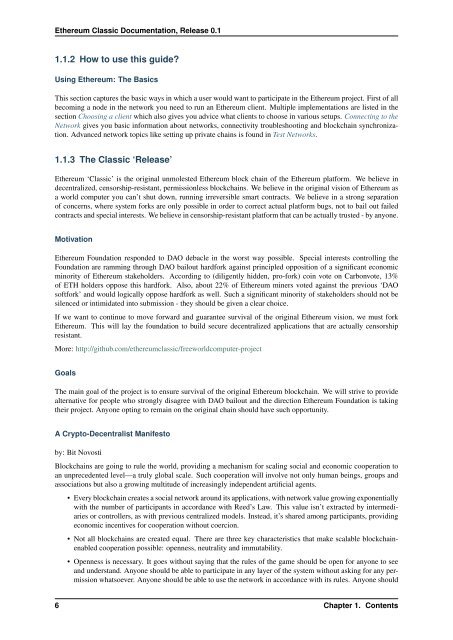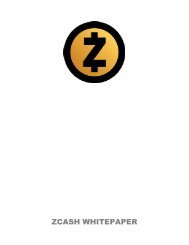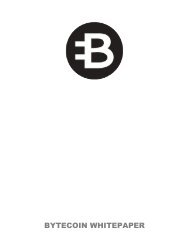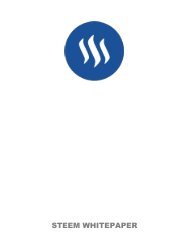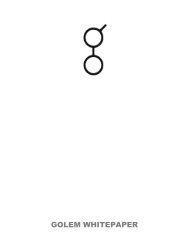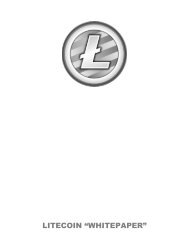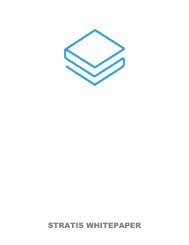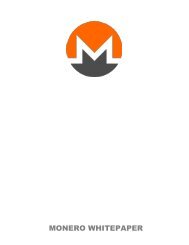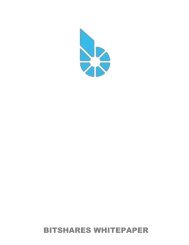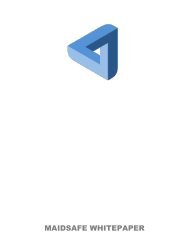Whitepaper - Ethereum Classic With Cover
You also want an ePaper? Increase the reach of your titles
YUMPU automatically turns print PDFs into web optimized ePapers that Google loves.
<strong>Ethereum</strong> <strong>Classic</strong> Documentation, Release 0.1<br />
1.1.2 How to use this guide?<br />
Using <strong>Ethereum</strong>: The Basics<br />
This section captures the basic ways in which a user would want to participate in the <strong>Ethereum</strong> project. First of all<br />
becoming a node in the network you need to run an <strong>Ethereum</strong> client. Multiple implementations are listed in the<br />
section Choosing a client which also gives you advice what clients to choose in various setups. Connecting to the<br />
Network gives you basic information about networks, connectivity troubleshooting and blockchain synchronization.<br />
Advanced network topics like setting up private chains is found in Test Networks.<br />
1.1.3 The <strong>Classic</strong> ‘Release’<br />
<strong>Ethereum</strong> ‘<strong>Classic</strong>’ is the original unmolested <strong>Ethereum</strong> block chain of the <strong>Ethereum</strong> platform. We believe in<br />
decentralized, censorship-resistant, permissionless blockchains. We believe in the original vision of <strong>Ethereum</strong> as<br />
a world computer you can’t shut down, running irreversible smart contracts. We believe in a strong separation<br />
of concerns, where system forks are only possible in order to correct actual platform bugs, not to bail out failed<br />
contracts and special interests. We believe in censorship-resistant platform that can be actually trusted - by anyone.<br />
Motivation<br />
<strong>Ethereum</strong> Foundation responded to DAO debacle in the worst way possible. Special interests controlling the<br />
Foundation are ramming through DAO bailout hardfork against principled opposition of a significant economic<br />
minority of <strong>Ethereum</strong> stakeholders. According to (diligently hidden, pro-fork) coin vote on Carbonvote, 13%<br />
of ETH holders oppose this hardfork. Also, about 22% of <strong>Ethereum</strong> miners voted against the previous ‘DAO<br />
softfork’ and would logically oppose hardfork as well. Such a significant minority of stakeholders should not be<br />
silenced or intimidated into submission - they should be given a clear choice.<br />
If we want to continue to move forward and guarantee survival of the original <strong>Ethereum</strong> vision, we must fork<br />
<strong>Ethereum</strong>. This will lay the foundation to build secure decentralized applications that are actually censorship<br />
resistant.<br />
More: http://github.com/ethereumclassic/freeworldcomputer-project<br />
Goals<br />
The main goal of the project is to ensure survival of the original <strong>Ethereum</strong> blockchain. We will strive to provide<br />
alternative for people who strongly disagree with DAO bailout and the direction <strong>Ethereum</strong> Foundation is taking<br />
their project. Anyone opting to remain on the original chain should have such opportunity.<br />
A Crypto-Decentralist Manifesto<br />
by: Bit Novosti<br />
Blockchains are going to rule the world, providing a mechanism for scaling social and economic cooperation to<br />
an unprecedented level—a truly global scale. Such cooperation will involve not only human beings, groups and<br />
associations but also a growing multitude of increasingly independent artificial agents.<br />
• Every blockchain creates a social network around its applications, with network value growing exponentially<br />
with the number of participants in accordance with Reed’s Law. This value isn’t extracted by intermediaries<br />
or controllers, as with previous centralized models. Instead, it’s shared among participants, providing<br />
economic incentives for cooperation without coercion.<br />
• Not all blockchains are created equal. There are three key characteristics that make scalable blockchainenabled<br />
cooperation possible: openness, neutrality and immutability.<br />
• Openness is necessary. It goes without saying that the rules of the game should be open for anyone to see<br />
and understand. Anyone should be able to participate in any layer of the system without asking for any permission<br />
whatsoever. Anyone should be able to use the network in accordance with its rules. Anyone should<br />
6 Chapter 1. Contents


